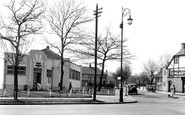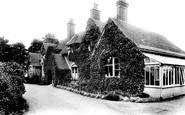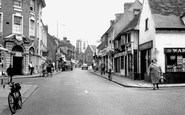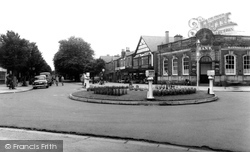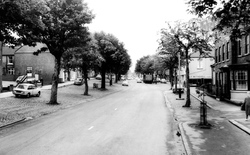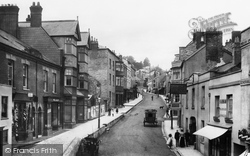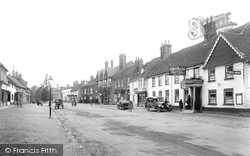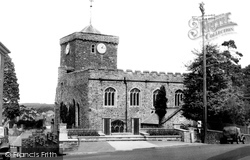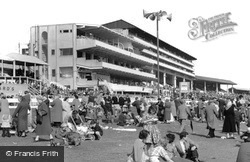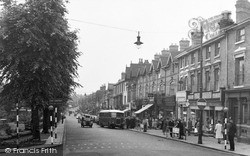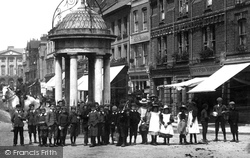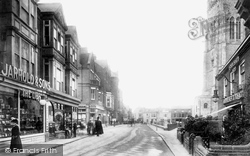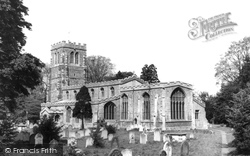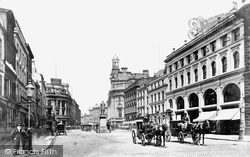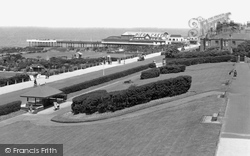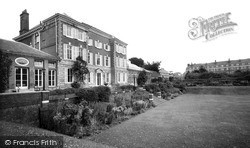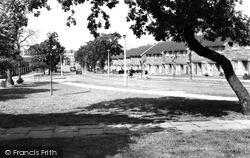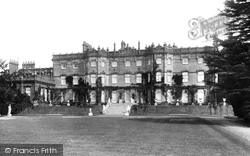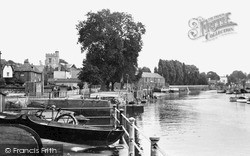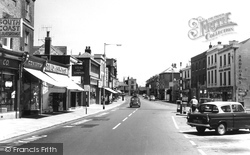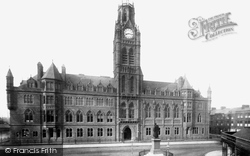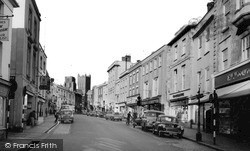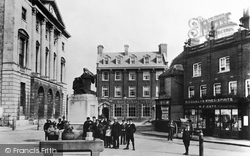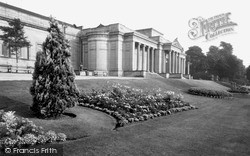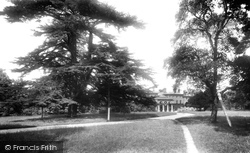Places
4 places found.
Those places high-lighted have photos. All locations may have maps, books and memories.
Photos
115 photos found. Showing results 421 to 115.
Maps
21 maps found.
Books
Sorry, no books were found that related to your search.
Memories
1,091 memories found. Showing results 211 to 220.
My Early Years In Batley Carr
I LIVED IN 23 UPPER MOUNT STREET, MY NEIGHBOURS WERE KATHRINE HILL, PAUL AINSWORTH. BRIAN DUXBERRY MARGARET HALLAS THE STUBLEYS AND A FEW MORE. I WENT TO WARWICK ROAD SCHOOL UNTIL 1958. SOME OF MY TEACHERS WERE MR. ...Read more
A memory of Batley Carr by
War Time In Shirley
I was born in Croydon in 1936, and lived In West Way, Shirley. My mother could not bear to part with us, so we lived at home all through the war. A bomb was dropped into the garden next door. After six months it was discovered it ...Read more
A memory of Shirley by
Born In Hounslow 1963
I was born at home in Lampton Road (opposite The Bulstrode) in January 1963 where I lived until 1970 when we moved to Heston (not far from Henley's roundabout). I can remember regularly cycling to Lampton Park and learning ...Read more
A memory of Hounslow by
Mothers Home
blaen has always been special to me as it is the first thing you see when you walk into the house as mountain row is immediately above the railway station in ferndale and the big tip is above ferndale on the llanwonno road it used to ...Read more
A memory of Blaenllechau by
Hawthorn
I had a very happy childhood growing up in Hawthorn until I left at the age of fifteen to join the Royal Navy in 1960. Hawthorn consisted of two distinct halves separated by a 'main road'. The top site had flat roofs while ...Read more
A memory of Hawthorn by
Up The Overs
Walking free through the wet grass leaving dark trails. Ahead the meadow rises to the mill bank where we stand in silence. Silent and smooth the deep mill race slides towards the wheel. Turning away we follow the bank upstream to ...Read more
A memory of Kempston in 1950 by
Ashford Cottage Hospital
RE Photo 60335 - Sorry, but this photo is of the building that replaced the original Hospital built (circa 1890) in Station Road (formerly Marsh Street) a few doors from the Baptist Church and next to the town's Gas ...Read more
A memory of Ashford in 1940 by
Days Gone By
I remember the Blitz and losing family at 43/45 Belville Street. I was only 7 then didn't fully realize the overall mayhem of these two nights in May 1941. My dad moved us all to New Lanark where we stayed for two years before ...Read more
A memory of Greenock in 1941 by
Exciting And Interesting Times
Not sure if anyone reads their comments later in life, but in response to one, it was Cliff Bennett and the Rebel Rousers. Cliff lived in Long Lane, next door to where I lived when I was 3 or 4. We lived in the ...Read more
A memory of Uxbridge in 1968 by
Grandparents
My grandfather, Peter Brown, was born in Coldstream in 1875. His parents, John and Mary Ann Wallace lived in a cottage on the Hirsel estate. Peter was a joiner, as was John. Peter emigrated to New Zealand and was the first person ...Read more
A memory of Coldstream by
Captions
544 captions found. Showing results 505 to 528.
The roundabout has now been joined by several traffic-calming devices to cope with traffic volume, and at the beginning of the new millennium a set of pedestrian-operated traffic lights was
New Road, another Victorian street, runs off to the right; at its junction with Westgate we see Wetherall's furniture store, still serving the needs of the town today.
In 1815 Sir George Jerningham began paying it the sum of £60 a year, and, together with his brother Edward, built a new church on the site. It opened on 5 June 1817.
We are looking north-westwards up Bell Street from the Assembly Rooms. Middle Row juts out (bottom left), and the raised pavement leads to Bell Cliff (bottom left).
Situated in the High Street, this late medieval courtyard inn dates from 1474, and before its restoration in the 18th century was jettied along its entire frontage.
Near to this point was the former Guild Hall, or 'gildhus' and there are also many references to the market activities in this area until 1827 when the new building was constructed in Market Street
Coronation Day in 1953 was celebrated with street parties, sports events and luncheons for the elderly.
Also lost during the town centre development was the Wesleyan Methodist Church, which had stood on the corner of the Parade and Newhall Street.
The Dock Link Road is planned to go from Spalding Road to Skirbeck Road via the dock, with a bridge over the Haven at the south end of High Street.
The members of the Board took steps to get the entire town properly drained, and to restrict animals wandering the High Street too freely on market-day.
By the time of this photograph Cromer had experienced a continuing building boom, which included new premises for fashionable stores such as Jarrold & Sons (left), who are still flourishing both in Cromer
As the town began to recover from the effects of the war, the Urban District Council turned its attention to providing the new housing that the town needed.
The Royal Exchange dominates Exchange Street, which starts where the square becomes narrower.
Since 1838 Fleetwood had had a theatrical pavilion in Dock Street, and a daily conveyance at Poulton met the Fylde Union coach to and from Fleetwood's new bathing station, but it did not have a pier.
despite vociferous local opposition, struck a deal to sell the site to their preferred developers, the property group Dawnay Day, who own most of the shops and flats on the south side of King Street
The Redgrave Road area of Vange did have a few pre-New Town shops near the Bull public house in Bull Road, and were reasonably near other old shops, which were mainly on the A13 road at Vange and Pitsea
Arthur Vernon, Architect and Mayor The career of Arthur Vernon, architect and JP, born in 1846, is a good example of Wycombe's new class of industrialists and professionals.
despite vociferous local opposition, struck a deal to sell the site to their preferred developers, the property group Dawnay Day, who own most of the shops and flats on the south side of King Street
As the population of Fareham increased during the 1820s and 1830s, there was a need for more schools, another church, a new workhouse, and a library and lecture hall.
Towards the end of the 19th century it was decided that the town needed a town hall commensurate with its new affluent status.
Liptons the grocer's (left), a café from 1910 to the 1920s, is now Dixon's. Beside Liptons, the Pearl Assurance sign hides that of the Kings Head.
In the terms of his will, however, he left instructions that his estate - which now consisted of Moulsham and Chelmsford - should remain in one piece as it passed to his successive male heirs.
Reference has already been made to the rapid expansion of Sheffield's east end - Brightside, Attercliffe and Darnall - to accommodate the tens of thousands of new workers in the heavy steel industry
A new estate of large houses was begun on the site in 1932, but it was not completed until after the Second World War.
Places (4)
Photos (115)
Memories (1091)
Books (0)
Maps (21)

